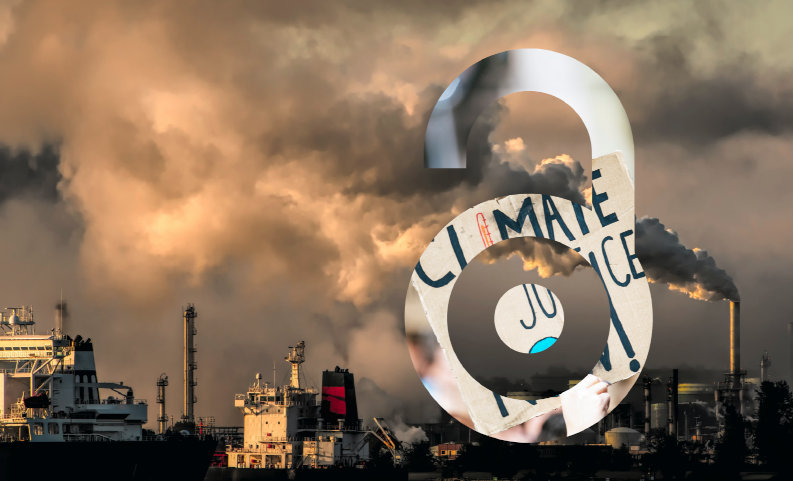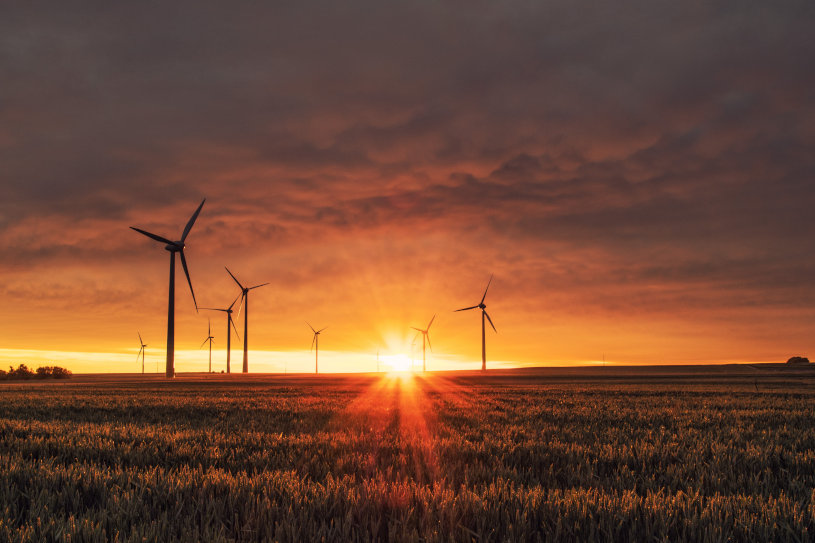OA Week Day 1: Open access and climate justice

Sarah Dar, Scholarly Communications Officer
There is no doubt that we need to address the issue of climate change- almost daily we are seeing catastrophic results of global warming, evidenced most recently by the devastating floods in Pakistan. Research on global warming and climate change are key to developing strategies to deal with the crisis and open science has a critical role to play in this. This blog post addresses the ‘open for climate justice’ theme of International Open Access Week 2022 by briefly considering why open science matters when talking about climate change and how open access publishing can support sustainability.
Research is fundamental to understanding, addressing and mitigating the effects of climate change. A wealth of research exists and continues to be funded and undertaken, from understanding causes and effects of climate change, adapting and reducing climate impacts, to protecting, preserving and restoring biodiversity, and creating sustainable energy solutions.
All of this vital research has been essential for developing national and international policy and solutions to the crisis, as well as communicating climate justice issues to the public worldwide. The openness of research is crucial to this.
Research needs to be shared quickly and openly to have maximum impact. During the COVID-19 crisis, access to research was opened up in a way that it hadn’t before: publishers such as Elsevier and Springer Nature made newly written COVID-19 related articles freely accessible to all; pre-prints, data and code were widely shared. The open sharing of research enabled collaborations and progress to be made quickly and effective COVID-19 vaccines were developed in record time. The response to COVID-19 demonstrates that research can make an immediate impact when it is open.
The climate crisis is similarly urgent- if emissions are to be reduced by 45% by 2030 and reach net zero by 2050, then a similar rapid response is required.
The continuation of subscription-based publishing means that a lot of research remains inaccessible to researchers, particularly those in the Global South. Tai and Robinson (2018) note that open access material tends to be cited more by policy makers, consequently there is a lot of vital research that they are missing out on because of paywalls. Free and open access to publications and all aspects of research, from data to methodologies, code, protocols (and more) is required so that climate science and policy interventions can progress as fast as they can.
 When research is made open the potential for transformation is huge not only in terms of the acceleration of scientific progress, but through the creation of greater social impact as research is used by policy makers and communicated to non-academic audiences by mainstream news and social media (Tai and Robinson 2018). It could be argued that open research is more ‘environmentally friendly’ as there is less wastage of resources- when data is shared, there is the possibility of re-use which removes the need for data collection and the costs and resources associated with this. We all have a role to play in reducing the negative effects of climate change and so we all need access to the knowledge that will enable us to do so.
When research is made open the potential for transformation is huge not only in terms of the acceleration of scientific progress, but through the creation of greater social impact as research is used by policy makers and communicated to non-academic audiences by mainstream news and social media (Tai and Robinson 2018). It could be argued that open research is more ‘environmentally friendly’ as there is less wastage of resources- when data is shared, there is the possibility of re-use which removes the need for data collection and the costs and resources associated with this. We all have a role to play in reducing the negative effects of climate change and so we all need access to the knowledge that will enable us to do so.
International organisations, including large funders, acknowledge the role of open access in supporting social, political and economic development. Open access has been recognised as key to the United Nations’ sustainable development goals (SDGs) and on climate action in particular, by enabling access to research and data to raise awareness of issues and foster discussion; providing access to information to inform policy makers, and information to inform project formulation and mitigation strategies (Taylor & Francis 2022). UNESCO states “OA has a fundamental role to support the SDGs and is committed to making OA one of the central supporting agendas to achieve the SDGs”.
Last year Creative Commons, SPARC and EIFL launched a global campaign “to promote open access, open science and open data as effective enabling strategies to accelerate progress towards solving the climate crisis and preserving global biodiversity”. The project has set itself a number of tasks:
- coordinating a campaign to open the most important climate and biodiversity research publications not already open access
- removing legal and policy barriers to applying open licenses to research articles
- influencing key funders of climate science and biodiversity research to adopt and implement strong open access policies
- identifying opportunities to open climate and biodiversity educational resources for students, teachers and citizens
The initiative also aims to encourage global environment organizations to make their content free to reuse, and will engage researchers in the Global South to ensure inclusivity. Time will tell what impact this will have, but it is an important step in facilitating openness in knowledge sharing and collaboration in critical climate and biodiversity work. You can read more about the project here.
 As well as barriers to open access such as high costs of publishing and embargoes, the practices of those involved in scholarly publishing need to be addressed. Making research open is all well and good, but we need to make sure this is done in a way that does not negatively impact the environment. Scholarly publishing practices impact upon sustainability: from running offices and operating websites, to manuscript processing, publication and distribution (Irfanullah, 2021). Many processes have moved online so some of these impacts have been mitigated, but the issue of energy consumption by information and communication technologies needs to be engaged with (ibid.) The same applies to storage and preservation practices that support open research: large data centres use vast amounts of energy which result in high greenhouse gas emissions, and file sharing also has impacts on energy use (see Addis, 2022).
As well as barriers to open access such as high costs of publishing and embargoes, the practices of those involved in scholarly publishing need to be addressed. Making research open is all well and good, but we need to make sure this is done in a way that does not negatively impact the environment. Scholarly publishing practices impact upon sustainability: from running offices and operating websites, to manuscript processing, publication and distribution (Irfanullah, 2021). Many processes have moved online so some of these impacts have been mitigated, but the issue of energy consumption by information and communication technologies needs to be engaged with (ibid.) The same applies to storage and preservation practices that support open research: large data centres use vast amounts of energy which result in high greenhouse gas emissions, and file sharing also has impacts on energy use (see Addis, 2022).
Whilst everything we do to some extent requires energy, we can make choices that are more sustainable such as switching to green or renewable energy, improving the energy efficiency of our systems, and changing to low-carbon or carbon-neutral practices. When managing research data for example, we might consider how we use resources. Do you really need to preserve all of your data or only part of it? Can you create low-footprint versions of your content for others to access?
Across the globe publishers are choosing to commit to action on climate change: the SDG Publishers Compact, an initiative between the United Nations and the International Publishers Association, aims to accelerate progress to achieve the Sustainable Development Goals (SDGs) by 2030 by championing the goals and developing sustainable practices. In the UK, members of the book and journal publishing industry have made a sustainability pledge through an initiative that aims to raise awareness of sustainability issues. Publishing Declares, which was launched by the Publishers Association, also aims to aid the discovery of existing tools and resources and to inspire action that results in sustained behaviour change (Publishers Association 2021).
The response to the pandemic of the last few years has demonstrated that open research has the potential to accelerate progress on urgent issues facing humanity and transform the world. We now need to ensure that we apply the same approach towards the climate crisis. The challenge facing life on earth is huge, but if we put our faith in open science and do what we can to minimise our impact on the environment, we may be able to change our world.
References
Addis, M. (2022) Is digital preservation bad for the environment? Reflections on environmentally sustainable digital preservation in the cloud. Digital Preservation Coalition Blog. 14th March, 2022. https://www.dpconline.org/blog/is-digital-preservation-bad-for-the-environment
Besançon, L., Peiffer-Smadja, N., Segalas, C. et al. (2021) Open science saves lives: lessons from the COVID-19 pandemic. BMC Med Res Methodol 21, 117. https://doi.org/10.1186/s12874-021-01304-y
Green, C. (2021) Creating a Campaign to Increase Open Access to Research on Climate Science and Biodiversity: A joint initiative of Creative Commons, EIFL and SPARC. https://creativecommons.org/2021/11/08/creating-a-campaign-to-increase-open-access-to-research-on-climate-science-and-biodiversity-a-joint-initiative-of-creative-commons-eifl-and-sparc/
Irfanullah, H. (2021) Climate Responsibilities of Scholarly Publishing. The Scholarly Kitchen, 15th April, 2021. https://scholarlykitchen.sspnet.org/2021/04/15/climate-responsibilities-of-scholarly-publishing/
Larivière, V., Shu, F. & Sugimoto, C. (2020) The Coronavirus (COVID-19) outbreak highlights serious deficiencies in scholarly communication. LSE Impact Blog, 5th March, 2020. https://blogs.lse.ac.uk/impactofsocialsciences/2020/03/05/the-coronavirus-covid-19-outbreak-highlights-serious-deficiencies-in-scholarly-communication/
Publishers Association (2021) Publishing industry makes sustainability pledge. https://www.publishers.org.uk/publishing-industry-makes-sustainability-pledge/ Accessed on 13/10/2022
Tai, T.C. and Robinson, J.P.W (2018) Enhancing Climate Change Research With Open Science. Frontiers in Environmental Science, 6:115. doi: 10.3389/fenvs.2018.00115
Taylor & Francis (2022) Open Access is key to the Sustainable Development Goals https://taylorandfrancis.turtl.co/story/open-access-is-key-to-the-sustainable-development-goals/page/1?teaser=yes
UNESCO Open Access to Scientific Information. https://en.unesco.org/themes/building-knowledge-societies/open-access-to-scientific-information Accessed 18/10/2022
Photo credit:
Markus Spiske, Unsplash
Karsten Wurth, Unsplash
For more information please contact the Corporate Communications Team.


/prod01/wlvacuk/media/departments/digital-content-and-communications/images-2024/Diane-Spencer-(Teaser-image).jpg)
/prod01/wlvacuk/media/departments/digital-content-and-communications/images-18-19/220325-Engineers_teach_thumbail.jpg)
/prod01/wlvacuk/media/departments/digital-content-and-communications/images-2024/241024-Dr-Christopher-Stone-Resized.jpg)
/prod01/wlvacuk/media/departments/digital-content-and-communications/images-2024/241014-Cyber4ME-Project-Resized.jpg)
/prod01/wlvacuk/media/departments/digital-content-and-communications/images-2024/240315-Research-Resized.jpg)
/prod01/wlvacuk/media/departments/digital-content-and-communications/images-2024/WMCA-event-(teaser).jpg)